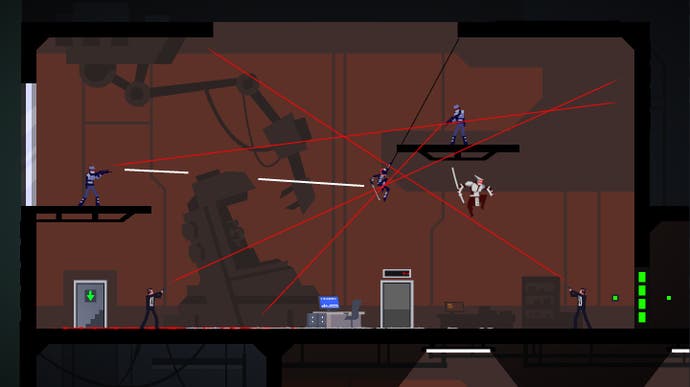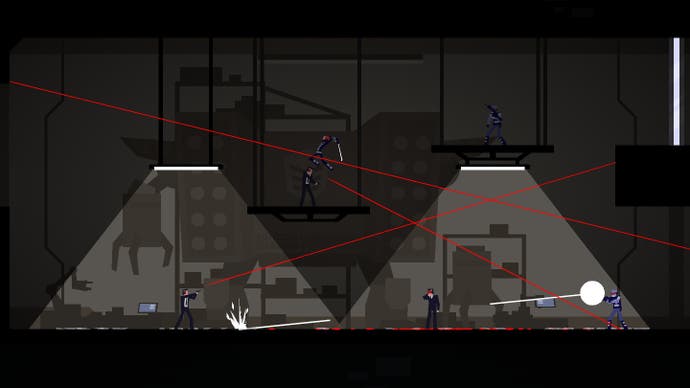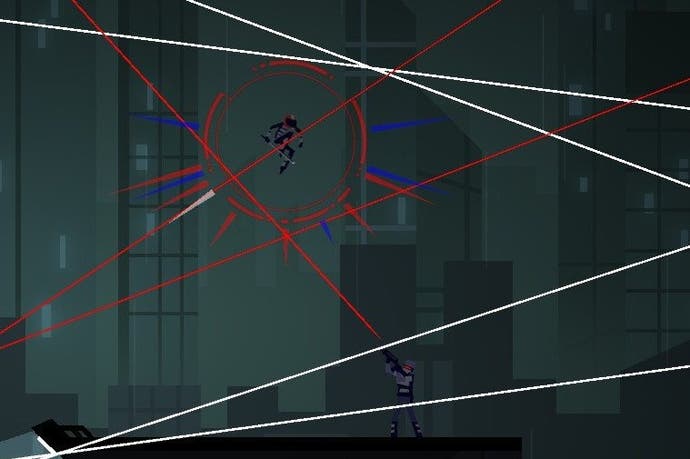Ronin review
Slice of life.
When is a stealth game not a stealth game? When it explicitly tells you it is not a stealth game, but then goes on to punish you harshly for not being stealthy enough. That's the frustrating contradiction at the heart of indie ninja game Ronin, and it's one that unfortunately detracts from an otherwise nicely designed game with some ingenious gameplay ideas.
You're playing as a very modern sort of ninja, wielding a sword but clad in motorbike leathers and helmet, and your goal is to execute five targets who have wronged you in some terrible yet unexplained way. First you must infiltrate buildings and hack computers to track down the next target, then you must battle your way through their guards to deliver the killing blow.
Gameplay is openly and unapologetically lifted from 2013's super-spy gem Gunpoint, but it's OK since that game's developer, Tom Francis, has given his blessing for others to riff on his design. That means that in Ronin, as in Gunpoint, you spring and cling your way around each level, using the mouse to aim your leaps, bursting through windows, scaling walls and dropping on enemies.

The difference is that whereas Gunpoint offered a deep hacking system, which allowed you to connect in-game objects electronically, Ronin innovates in combat instead. Despite having a move set that lends itself to sneaking, the game conspires to constantly put you in situations where you cannot help but be spotted by multiple guards. This triggers a turn-based fighting system that sounds like madness but is actually rather ingenious.
So you get spotted. The action freezes and you can decide where you'll leap to. Once you've moved, the enemy responds. Jumping into an enemy will knock them over, but delivering a killing blow must wait until the next turn. Meanwhile, other enemies will have taken the chance to aim at you, their red lines cutting through the spot you're standing on. If you're still there in the next turn, you're shot and killed instantly. Sometimes your turn will end with you still in mid-air, at which point you can either enter the next turn, letting gravity continue to do its job, or use your grapple hook to redirect your momentum and confound enemies that way.
It sounds weird and confusing, and is devilishly hard to explain in words, but when playing it quickly makes perfect sense. Rather than breaking up the game, this staccato rhythm actually gives combat an oddly cinematic flair. Like all good kung fu movies, these split-second freeze frames allow you to feel like a real ninja; chaining together acrobatic leaps and brutal kills, always one step ahead of incoming fire. New enemy types force you to consider new tactics, such as the hulking armoured samurai who will cut you in half if you try to tackle them, and later stages really test your abilities to the limit, with encounters that turn the screen into a web of laser sights. When you pull it off, surviving these encounters without a scratch, the result is both unique and empowering.
That's when you pull it off. Though the concept is a delight, the execution often falls short. Movement lacks the necessary rigour, with the mouse aiming for your jumps proving slippery and imprecise under pressure. Also problematic is the fact that, once in combat, jumping is literally all you can do. For the turn based system to work, you can't be allowed the freedom to run, climb or interact with the scenery during a fight, so right when you need them most the game shrinks your traversal options to the bare minimum, inconveniencing the player for the sake of its own mechanics.
If you want more abilities, such as throwing your sword, a shuriken blast or a cool teleport move, you need to unlock them by completing secondary objectives. These are marked as optional, but given how essential your upgrades are in the tough latter stages, they're really anything but. Killing every enemy, not triggering the alarm and avoiding civilian casualties are all required in order to earn a skill point, and I do mean all required. It's not enough to achieve two of those conditions in a stage - to get a skill point, all three must be met.

There's nothing inherently wrong with skill points requiring skill to attain, of course, but too often Ronin feels like it relies on luck as well. The level will contrive ways to make your path cross with civilians, for instance, at which point they will start to raise the alarm. You can knock them over, but never knock them out. They'll get up and start raising the alarm again, until you're forced to kill them. Except, because of the game's all or nothing mentality, by achieving one goal you've failed another. No skill point for you.
This means that while you can progress without learning new skills, failure is compounded as you enter tougher and tougher levels without the abilities needed to tackle them successfully. As such, Ronin feels constantly at odds with itself, so determined to show off its combat that it contradicts the natural flow of the game structure it has inherited. All of the "optional" objectives suggest and reward stealthier play; one of the unlockable abilities is even called "Stealth Kill". Yet the game is adamant that it isn't a stealth game, saying as much in one of the loading screen text hints, and so constantly forces you into situations where you are exposed purely to prove its point.
It's undeniably stylish, with an appealing aesthetic made up of sharp lines and block colour, and its turn-based approach to the action platformer genre is quirky but bursting with potential. It's just a shame that its promise is obscured by punitive design which demands fussy perfection right from the start, yet struggles to give you the tools needed to meet its high standards. Levels feel restrictive rather than rewarding exploration and strategy, and the appeal of that stop-start blood-spraying action dims the more the game forces it on you in increasingly ferocious iterations.
It feels weird to be saying this at a time when sequels are far too prevalent, but while Ronin has its moments of brilliance during its short campaign, it ultimately feels very much like a proof of concept for a more generous and balanced game yet to come.

